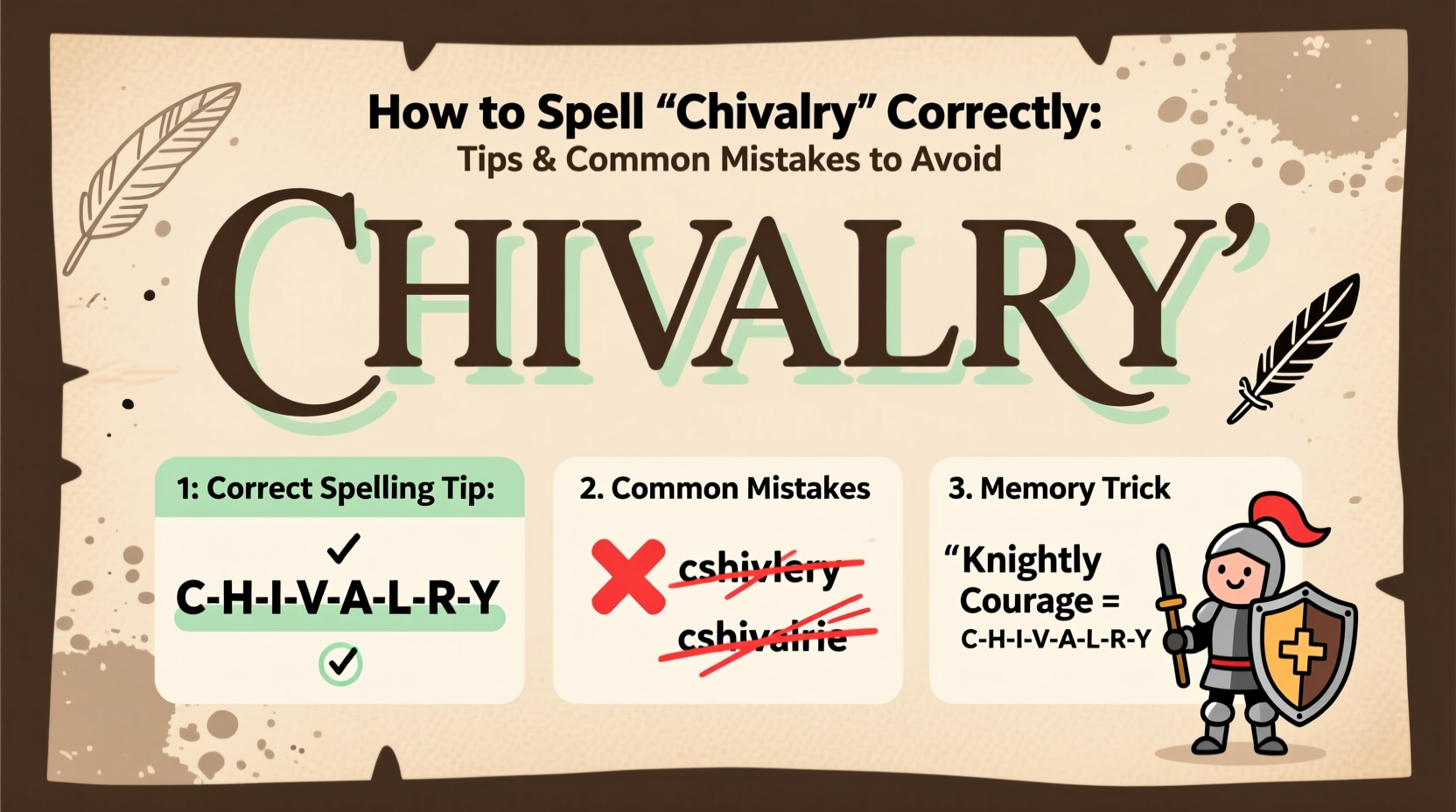The word “chivalry” carries a rich historical weight, evoking images of knights, honor, and noble conduct. Yet, despite its cultural significance, many people struggle to spell it correctly. Whether you're writing an essay, crafting a professional email, or simply want to improve your vocabulary, knowing how to spell “chivalry” accurately—and understanding why it’s often misspelled—is essential. This guide breaks down the correct spelling, explores common errors, and provides actionable strategies to ensure you never second-guess this word again.
Understanding the Word: What Does “Chivalry” Mean?

Before mastering the spelling, it helps to understand what “chivalry” means. Originally derived from the French *chevalerie* (meaning “horse soldiery”), the term historically referred to the medieval knightly system with its emphasis on bravery, courtesy, and honor. Today, it’s often used more broadly to describe courteous behavior—especially by men toward women—though modern interpretations also emphasize respect, integrity, and protective kindness regardless of gender.
Knowing the origin and meaning can actually aid in spelling. The root “cheval” relates to “horse,” which connects to knights and cavalry—key elements of chivalric tradition. This background makes the “chiv-” beginning more logical than arbitrary.
Correct Spelling and Breakdown
The correct spelling is: chivalry.
Let’s break it down phonetically and structurally:
- Chiv-: Pronounced /ˈʃɪv/ (like “shiv”), not “chive” as in garlic chives.
- -al-: A common suffix indicating relation or connection.
- -ry: Often confused with “-ery,” but in this case, it’s “-ry” as in “knighthood” or “bravery.”
So, “chivalry” = chiv + al + ry.
It's important to note that while the pronunciation might suggest alternate spellings like “shivalry” or “chivery,” the standard English spelling retains the French-influenced “chiv-” prefix.
Common Misspellings and Why They Happen
Even experienced writers occasionally trip over “chivalry.” Here are some of the most frequent misspellings and the reasons behind them:
| Incorrect Spelling | Why It’s Wrong | Root Cause |
|---|---|---|
| chivarly | Missing the ‘y’ after ‘chiv’ | Visual similarity to words like “marshal” or “varlet” |
| chivary | Drops the ‘l’ | Pronunciation blends ‘al’ into one sound |
| shivalry | Uses ‘s’ instead of ‘ch’ | Phonetic confusion: “ch” sounds like “sh” here |
| chivalery | Extra ‘e’ before ‘ry’ | Overgeneralization from words like “cannery” or “gallery” |
| chiverly | Reorders letters, adds ‘e’ | Memory lapse or phonetic approximation |
These errors typically stem from mishearing the word or applying spelling patterns from similar-looking terms. But consistency comes with awareness and repetition.
“Spelling isn’t just about memorization—it’s about recognizing patterns and origins. ‘Chivalry’ follows a French-derived structure uncommon in everyday English, which makes it prone to error.” — Dr. Lila Monroe, Linguistics Professor at Oxford
Step-by-Step Guide to Mastering the Spelling
To internalize the correct spelling of “chivalry,” follow this simple five-step process:
- Break it into syllables: chiv·al·ry. Say each part slowly and clearly.
- Visualize the word: Write it multiple times, focusing on the sequence: C-H-I-V-A-L-R-Y.
- Create a mnemonic: Try: “Courteous Heroes In Velvet Armor Leave Respect Yearly.”
- Use it in context: Write sentences like: “His act of opening the door was a small but genuine display of chivalry.”
- Test yourself: After 24 hours, write the word from memory without looking. Repeat over three days for retention.
Checklist: How to Avoid Future Spelling Errors
Use this checklist whenever you’re unsure about spelling “chivalry” or teaching it to others:
- ✅ Confirm the word starts with “chiv-”, not “shiv-” or “chive-”
- ✅ Ensure the middle contains “-al-”, not just “a” or “ar”
- ✅ Double-check that it ends in “-ry”, not “-ery” or “-ley”
- ✅ Pronounce it aloud: /ˈʃɪv.əl.ri/ (SHIV-uhl-ree)
- ✅ Cross-reference with a trusted dictionary if uncertain
- ✅ Use spell-check tools, but don’t rely on them exclusively—they sometimes miss contextual errors
Real Example: When Spelling Matters
Sarah, a college student majoring in history, was drafting her final paper on medieval ethics. She wrote: “The decline of chiverly in modern society reflects broader moral shifts.” Her professor returned the paper with a red line through “chiverly” and a note: “Be mindful of spelling key terms—this changes the credibility of your argument.”
Though the meaning was clear, the misspelling undermined Sarah’s professionalism. After reviewing the correct form and using flashcards for reinforcement, she hasn’t made the mistake since. More importantly, she now approaches all subject-specific vocabulary with greater care.
This scenario illustrates that spelling isn’t just about correctness—it’s about precision and authority in communication.
Frequently Asked Questions
Is “chivalry” spelled differently in British and American English?
No, “chivalry” is spelled the same way in both British and American English. Unlike words such as “colour/color,” there is no variation across dialects.
Why does “ch” in “chivalry” sound like “sh”?
This is due to its French origin. In Old French, “chevalerie” had a soft “ch” pronounced as /ʃ/. English adopted both the word and its pronunciation pattern, even though “ch” usually sounds like /tʃ/ (as in “chair”).
Can “chivalry” be used in modern contexts without sounding outdated?
Absolutely. While rooted in medieval tradition, “chivalry” today often refers to respectful, protective behavior—such as standing up for someone being mistreated or showing empathy in leadership. Used thoughtfully, it remains a powerful descriptor of moral conduct.
Final Thoughts and Call to Action
Mastering the spelling of “chivalry” is more than a small victory in literacy—it’s a step toward clearer, more confident communication. By understanding its roots, recognizing common pitfalls, and practicing deliberate techniques, you ensure that this meaningful word appears exactly as intended in your writing.
Language evolves, but accuracy grounds us in clarity and respect—for both the words we use and the ideas they represent. Whether you’re composing an email, writing a speech, or helping a child with homework, take pride in getting it right.









 浙公网安备
33010002000092号
浙公网安备
33010002000092号 浙B2-20120091-4
浙B2-20120091-4
Comments
No comments yet. Why don't you start the discussion?